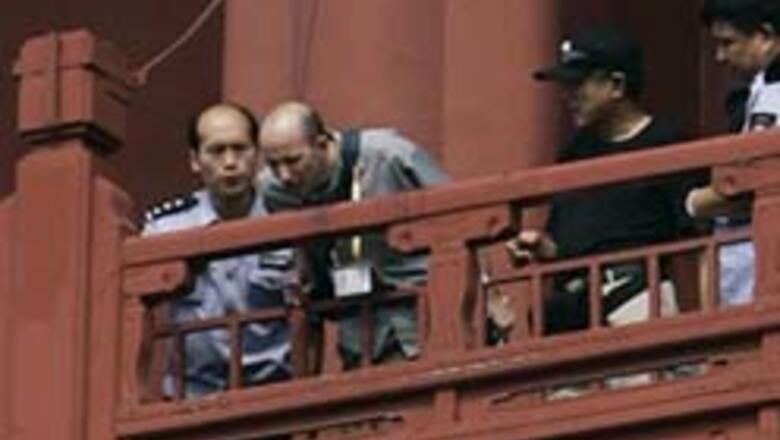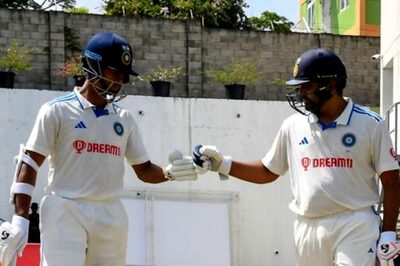
views
A 47-year-old Chinese man attacked two American relatives of the coach and a Chinese tour guide at a popular tourist site, leaving one man dead, Beijing police said.
The assailant then jumped to his death from high up the Drum Tower, a 700-year-old 45-metre high monument once used to sound time for the Chinese capital's residents. Attacks on foreigners in Beijing are rare.
Olympic organisers have deployed a 100,000-strong security force to protect the 10,500 athletes and thousands of spectators, citing the threat of terrorism but sparking criticism they were blocking protests.
Chinese hopes of quick wins were partly met as competition got under way in earnest. A woman's weightlifting gold and men's shooting gold came their way, though they lost the first medal to be awarded after the Chinese favourite buckled under pressure.
Katerina Emmons won the first gold, in the women's 10-metre air rifle, for the Czech Republic. Pre-Games favourite Du Li of China finished fifth and left in tears.
"There was pressure for all of us but for her it was even harder," Emmons said of her rival. "I'm sorry, but the Chinese press is putting a lot of pressure on Chinese athletes."
"I wasn't fully prepared for the pressure of competing at home," said Du, who won gold in Athens in 2004. Pang Wei restored home pride in the shooting with victory in the men's 10-metre air pistol, the second gold for China after Chen Xiexia won, as expected, in the women's 48kg weightlifting.
US swimming sensation Michael Phelps set off on his quest for a record eight gold medals, diving into the pool at the bubble-wrap Water Cube building to win his heat in the 400 metres individual medley in an Olympic record. Phelps first gold could come on Sunday, when the mighty US swim team is well-placed to triumph in three of the four finals being staged.
In the first event to test athletes' ability to withstand the heat and smog of a Beijing summer, Spain's Samuel Sanchez won the men's cycling road race along a gruelling 245-km route from the Forbidden City in Beijing to the Great Wall.
PAGE_BREAK
More than a third of contestants dropped out, including favourites like German Stefan Schumacher who said the humidity and smog made a hard course even tougher. "I have a very, very strong headache," said Schumacher, after abandoning the race.
"I suppose it's the pollution." The 2007 Tour de France winner Alberto Contador could not handle the heat either. "I just didn't have any more strength in the legs," said Contador after giving up. Sanchez's Spanish team mates said they had decided to work together to support whichever of them had the best chance to win.
"In the end it turned out that Samuel felt the best and so we played his card," said Spain's Carlos Sastre, this year's Tour de France winner. The women's cycling road race is along the same route on Sunday when it is forecast to be wet and cooler.
Tennis officials said they may allow heat breaks during matches to help players cope with stifling humidity and heat in the high 90s Fahrenheit. Competitors have said the conditions are among the toughest say they have faced.
Warnings smog would hinder performance have persisted despite an $18 billion campaign to clean the air around the city by shutting down smokestack industry and forcing cars off the roads.
US President George W. Bush watched the American beach volleyball teams practise, joining the women on court to volley a few balls, hitting two but missing the third. At one point, 2004 gold medal winners Misty May-Treanor jokingly bent over and offered Bush a chance to give her a pat on the rear. Instead, he playfully tapped her back.
Bush interrupted his Olympic visits to warn Russia it was escalating a conflict with Georgia over the breakaway South Ossetia region by attacking targets far from the conflict zone. The fierce fighting in the Caucasus has been a reminder of the limits of sport's ability to bring nations into harmony.
Calls for the Olympic truce to be honoured have gone unheard, and members of both the Russian and Georgian teams said the news from home had left them anxious. "It's not what the world wants to see.
It is contrary to what the Olympic ideal stands for," said Giselle Davies, spokeswoman for the International Olympic Committee. Olympics chief Jacques Rogge used his opening speech to appeal to the athletes to respect the Olympic spirit of fair play by competing without the help of prohibited drugs.
Hours later a Greek sprinter was sent home for failing an earlier drugs test in an echo of the Athens Games when two Greek sprint favourites were involved in a doping scandal.




















Comments
0 comment